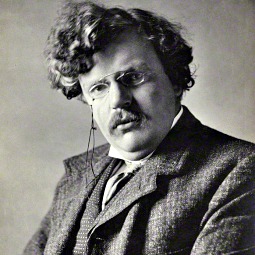Sainthood on the Horizon for G.K. Chesterton?
An investigation has begun into whether to open the cause for canonization of the English writer and convert.

Devotees of the English writer and Catholic apologist G.K. Chesterton rejoiced at the news that a Catholic bishop in England is seeking to open an investigation into whether he should be declared a saint.
Opening the annual conference of the American Chesterton Society at Assumption College, Worcester, Mass., society president Dale Ahlquist said that Bishop Peter Doyle of Northampton, England, “is seeking a suitable cleric to begin an investigation into the potential for opening a cause for Chesterton.”
Speaking to the Register, Father Ian Ker, author of G.K. Chesterton: A Biography, published by Oxford University Press, reacted to the announcement by saying, “The Church is looking for heroism, and Chesterton was heroic in his journalism — he always turned the other cheek. Thus, he was heroic in his apostleship.”
Stuart McCullough, founder of the Catholic G.K. Chesterton Society , told the Register that he believes Chesterton to be a saint: “Hundreds of converts to the Catholic faith cite Chesterton as the main reason for their conversion. In my case, he did not convert me, but he ‘introduced’ me to Hillaire Belloc, and that did the job.”
“Many small things make me believe it to be true,” said McCullough of Chesterton’s sanctity.
G.K. Chesterton was born in London in 1874. After an initial dalliance with the occult as a youngster, he became an increasingly orthodox High Anglican before his reception into the Catholic Church in 1922.
Known for his witty writing and love of finding truth in apparent paradox, Chesterton authored literary essays, novels, poetry, plays, philosophical works and Christian apologetics. As well as the stories about the priest detective Father Brown, Chesterton wrote numerous works, including The Everlasting Man and Orthodoxy. He died at Beaconsfield, England, in 1936. He is said to have influenced the thinking of many converts and writers, including C.S. Lewis.
McCullough added that the importance of Chesterton for today’s reader “is his joyful Catholic disposition in everything he did, said and wrote.”
“His example of conversion to the Catholic faith, which in 1920s England was not a universally popular move, is a good example to us all,” he continued. “While most politicians, writers and intellectuals supported the early eugenics movement, Chesterton did not. But even when engaging strongly with the pro-Nietzsche propagandists, such as George Bernard Shaw and H.G. Wells, he would never fall into the personal rancor that so occupies political and social commentary today, and he remained on good terms with both of them.”
Concluded McCullough, “He is, of course, relevant to everybody, because whatever manner of book you are interested in reading, he has written something in that genre.”
Growth of a Global Following
Each year, the Catholic G.K. Chesterton Society organizes a pilgrimage from London to Beaconsfield, where Chesterton spent most of his life. It is because of this that Chesterton’s cause falls under the remit of Bishop Doyle, as Beaconsfield is within the Diocese of Northampton.
Nevertheless, Father Ker added, “There is a growing interest in Chesterton in the world. He had been neglected for a very long time, but he has now entered much more into the mainstream.”
As such, he said, “There doesn’t necessarily have to be a local cult [of devotion], because there wasn’t one in Birmingham for Blessed John Henry Newman. People saw him as very holy and solemn when he died, but you couldn’t call it a cult.”
The point, though, is that it is a global cult,” said Father Ker. “He’s no longer just a local saint, but someone of interest to the universal Church.”
In a statement on the website of the American Chesterton Society, Ahlquist said, “I’m grateful for all of the work done by Chesterton devotees around the world that has prompted the bishop to make this very important decision.”
Cardinal Bergoglio’s Interest
Ahlquist cited Pope Francis’ interest in Chesterton as possibly influencing the bishop of Beaconsfield’s recent move for an investigation.
“One of the reasons that especially motivated him is the fact that His Holiness, Pope Francis, expressed support for Chesterton’s cause when he was the archbishop of Buenos Aires,” stated Ahlquist.
A March 10 letter to Martin Thompson, a leader of an English G.K. Chesterton group, from Miguel Angel Espeche Gil, an Argentine ambassador who heads a Chesterton group in Argentina, noted that the then-archbishop of Buenos Aires, Cardinal Jorge Bergoglio, “encourages us in our aspiration to see the initiation of the cause of Chesterton to the altars.”
Cardinal Bergoglio, who was elected as Pope Francis on March 13, approved the text of a private prayer for the canonization of Chesterton.
Pope Francis was also a member of an honorary committee of a conference for the Argentine Chesterton Society and celebrated a Mass for the conference.
The first stages of a canonization cause include collecting evidence of heroic virtue.
“There’s a goodness that just exuded from him,” Ahlquist told Catholic News Agency. “The biographical accounts of Chesterton always portray him as being very joyful and humble and good, so that everyone was just drawn to that, including his intellectual and philosophical enemies. The people who violently disagreed with Chesterton on the issues were drawn to him as a person because of his charity.”
Any investigation for sainthood can take many years, and not all causes succeed. A Vatican investigation and two recognized miracles attributed to the candidate’s intercession are necessary for the candidate to be declared a saint.
For Ahlquist, movement toward a cause for Chesterton’s canonization shows the universality of the Church.
He said, “The fact that a 300-pound, cigar-smoking journalist might be a saint of the Catholic Church made me understand what the communion of saints is all about. They’re not just one particular type of person.”
James Kelly writes from London.
Kevin Jones writes for Catholic News Agency.













